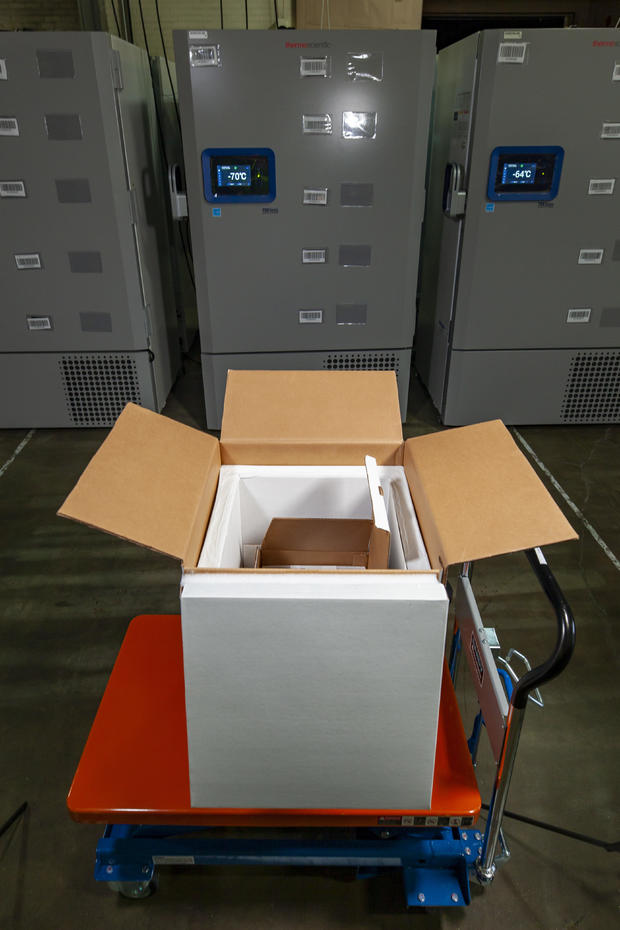The long wait for a vaccine that could eventually spell the end of the coronavirus pandemic appears to be on the horizon. Last week, Pfizer said its vaccine in a trial has been 90% effective in preventing COVID-19, while Moderna on Monday announced similarly encouraging results. The companies could get emergency federal approval within weeks. Yet it will only be after the drugmakers ship millions of doses around the world that the real time crunch on the vaccination effort begins.
Pfizer’s vaccine must be kept at nearly minus 100 degrees Fahrenheit to remain effective. That’s about 20 degrees colder than extreme winter temperatures at the South Pole. Early on, experts warned that the U.S. lacked the necessary ultra-cold storage trucks and cargo planes needed to ship hundreds of millions of doses at sub-sub-zero temperatures.
In order to get around that, Pfizer has developed specially built deep-freeze “suitcases” that can be tightly sealed and shipped even in non-refrigerated trucks. But while Pfizer may have solved the problem of how to ship the frozen vaccine, these highly engineered shipping containers create other problems, particularly for the hospitals, pharmacies and outpatient clinics that will have to administer the vaccinations to hundreds of millions of Americans.
“The reality is there has never been been a drug that required storage at this temperature,” said Soumi Saha, a pharmacist and director of advocacy at Premier, which acts as a purchasing agent for hospitals across the country. “The administration and distribution effort will require an all hands on deck.”
Among the many logistical and medical challenges that experts say will have to be overcome when vaccines are ready to roll:
- Pfizer’s shipping boxes, packed with specially formulated dry ice and containing between 1,000 and 5,000 vaccine doses each, can only be opened twice a day for less than three minutes at a time while maintaining temperature standards.
- Even so, the deep-freeze suitcases only hold their cool for 10 days. And the clock starts ticking when they are sealed, which for U.S. shipments will be at one of two Pfizer facilities, in either Kalamazoo, Michigan, or Pleasant Prairie, Wisconsin.
- Dry ice is considered a hazardous material and restricted on airplanes. Pfizer said its packages contain well under the acceptable limit. But given the logistical challenges, Premier’s Saha told CBS MoneyWatch that it could take up to four days for the vaccines to reach their destination. That gives many hospitals and pharmacies as few as just six days to administer up to 5,000 doses before they go bad, or as many as 833 a day. The vaccinations can be moved to a typical refrigerator, but for only five days.
- Pfizer’s shipping container can be refilled with dry ice. But it likely will have to be in pellets not blocks, and a refill, which could cost a few hundred dollars, will only extend the life of deep-freeze suitcase by five days.
- Hospitals can buy ultra-cold freezers, which will keep the vaccinations up to six months. But few hospitals or pharmacies have the specialty freezers, which can cost as much as $20,000 each, and are in short-supply. Manufacturer K2 told CBS MoneyWatch the wait for its ultra-cold freezers is now six weeks.
- Pfizer’s vaccination requires two doses 21 days apart, making it more complicated to deliver the required number of treatments with doses going to waste.
Moderna’s vaccine also must be shipped frozen, although at comparatively less frigid -4 degrees Fahrenheit. Still, that will require the company to secure hundreds of refrigerated trucks, while the vaccine can only be kept in a standard refrigerator for up to seven days.
Pfizer declined to offer specifics about the plan to distribute its vaccine. While the government is technically in charge of the overall vaccination effort, the company has opted to distribute its own vaccine. Pfizer has received $1.95 billion from the Operation Warp Speed to manufacture and distribute the first 100 million doses. The government will remain responsible for distributing syringes and other medical supplies needed for the vaccination effort.
In a statement to CBS MoneyWatch, a spokesperson for Pfizer said the pharmaceutical giant has “developed detailed logistical plans and tools to support effective vaccine transport, storage and continuous temperature monitoring.”
Emily Gerbers, director of business development at MDLogistics, which specializes in cold-storage supply chains, said that it’s not just vaccines that have to be shipped, but also COVID-19 treatments and antibodies. The pandemic supply chain has been growing and adapting, but it’s been hard for companies like hers to keep up with demand, she said.
“We are talking to people every day looking for solutions,” Gerbers said. “There is so much need for COVID services. You can’t build it fast enough.”
Another possibility is for vaccines to be stored in centralized deep-freeze warehouses before being moved to hospitals. But real estate brokerage firm JLL said cold-storage facilities make up less than 2% of the overall logistics warehouse market, and that until recently there has been very little investment in the market, making available space a problem. The vacancy rate for existing cold storage facilities is less than 5%.
“The pandemic threw demand way out of supply for the cold supply network,” said Mehtab Randhawa, a researcher at JLL. “Pfizer’s vaccine requires a very specific cold storage requirement that might not align with what is out there.”
Premier’s Saha said that hospitals still lack some basic information from Pfizer about the shipping container, such as its exact dimensions. Hospitals have also not yet been notified if they will serve as distribution points. Many are waiting for such notice before deciding on whether to invest in ultra-cold freezers or staff up for mass vaccinations.
Saha said many university hospitals do have ultra-cold freezers, but they typically are in their laboratories and would require permission from local health inspectors to be repurposed for vaccine storage. And while the government has said it will cover the costs of the vaccine, it’s not clear if hospitals and other providers will be reimbursed for the extra costs needed to store and quickly distribute the vaccines.
Already struggling rural hospitals might not have the funds to afford the extra costs, or serve large enough populations to make distributing 1,000 doses in a week to 10 days feasible, especially in the first phase of the vaccination effort when not everyone will be eligible.
“It’s a logistical nightmare for rural communities,” Saha said. “But no one is immune to the challenges distributing the vaccine poses for the medical industry.”


